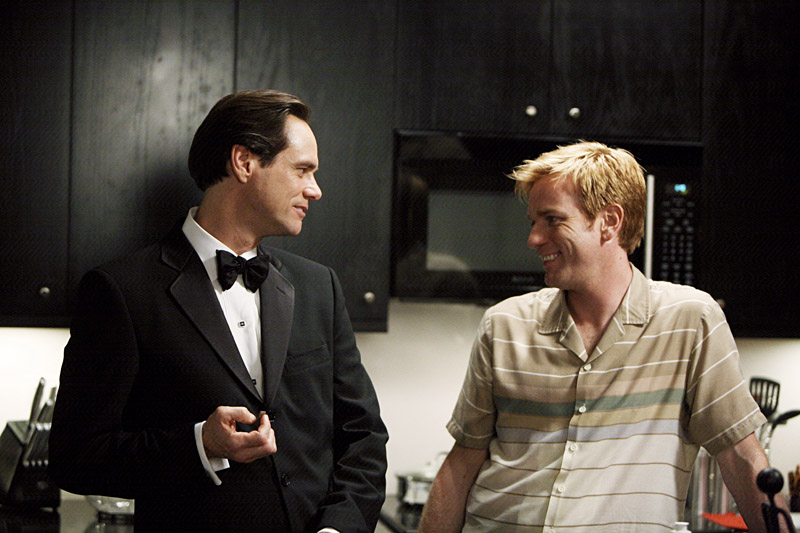It’s taken almost two years for the bonkers, exhilarating same-sex romantic comedy I Love You Phillip Morris to finally reach theaters. Premiering at Sundance in January 2009, the movie was a near-casualty of nervous-nellie U.S. distributors—more comfortable with innocuous gay genres like the homosexual weepie or the martyr biopic—and countless release delays. In the interim, we’ve bided our time with such high-profile, big-screen depictions of man/man love as Brüno pantomiming oral on the ghost of Rob Pilatus and Colin Firth’s suicidal fusspot furtively nuzzling Matthew Goode in a Single Man flashback. Save it, Mary: Nothing tops ILYPM‘s Jim Carrey as a top, sweatily, giddily ass-plowing a mustached muscle-daddy in the most gloriously raunchy, unrepentant moment in the an(n)als of Hollywood A-listers doing gay-for-pay.
Making their directorial debut, the screenwriting team Glenn Ficarra and John Requa (Bad Santa) adapted then–Houston Press reporter Steve McVicker’s 2003 book about the real-life adventures of con man Steven Russell (Carrey), who once maintained a highly hetero, upright life as a Virginia Beach cop and church organist, sweetly tucking in his daughter at night and saying prayers with wife Debbie (Leslie Mann). But after a near-fatal car crash while driving home from the aforementioned d.l. cornholing, Steven storms out of the closet (“I’m gonna be a fag!”) and moves to Florida, sashaying down a South Beach boulevard with hot boyfriend Jimmy (Rodrigo Santoro). Upscale lavender lifestyles come with steep price tags, however, and “living as high on the gay hog as I wanted to” leads Steven to credit-card and insurance fraud—and to prison in Texas, where he meets the delicate, diabetic love of his life, Phillip Morris (Ewan McGregor, a veteran of Uranian desire after 1998’s Velvet Goldmine). As they slow-dance and smooch to “Chances Are” in their cell during a prison riot, Steven vows to take care of everything, a lover’s promise that leads only to more spectacular crimes.
It also leads to the best performance of Carrey’s career. Where his unleashed id and rubbery body once served him as the new Jerry Lewis, that ’90s persona confined him to playing one sexless cretin after another. His later attempts as a more brooding romantic lead, in Eternal Sunshine of the Spotless Mind (2004) and Yes Man (2008), found him struggling to project emotional vulnerability, coming across instead as a tamped-down, listless narcissist. But in ILYPM, Carrey finds the perfect outlet for his manic energy: Id and libido are fused, with Steven driven by actual lust and the unwavering—and completely believable—determination to provide for his fragile boyfriend.
That Steven is both a die-hard romantic and a sociopath gives the filmmakers rich opportunities to tweak sodomite stereotypes, just as they scabrously destroyed Kris Kringle in Bad Santa. “Is the gay thing and stealing something that goes hand-in-hand?” asks wide-eyed Debbie (with whom Steven maintains a close relationship even after the rainbow flags start flying) about her newly out, arrested ex. Jimmy responds with “What the fuck are you talking about?”—but Jean Genet certainly thought so. Make no mistake: ILYPM isn’t a heady treatise on queer outlaws a la Todd Haynes’ Poison. But Ficarra and Requa do place Steven and Phillip firmly in the tradition of eternally devoted criminal lovers, a province reserved almost exclusively for straights onscreen (think Badlands). The film also acknowledges the economy of sexual service behind bars without phobically dwelling on it—a casualness about gay lust further revealed in the carnal relationship that Steven and Phillip, randy while in stir, continue to have once sprung, enjoying some vigorous offshore fellating during a Key West vacation.
ILYPM‘s boldest gambit (though one based entirely on fact) finds Steven, in his greatest scam, trying to fake his own death (I won’t say how)—a set piece that hilariously dares to send up the Academy’s gay necrophilia, in which the only good homo is a dead one (q.v. Philadelphia, Milk). “Love’s the reason I’m layin’ here dyin’,” Carrey says in drawled voiceover at the film’s beginning before flashing back to the insane, Eros-fueled follies that led him to the hospital bed where he’s currently flatlining. Though the end credits reveal the fate of the real-life Russell, the directors and Carrey prefer to close with an image suggesting an irrepressible and unbreakable (if incorrigible) man—a perfect ending to a film that advances the homosexual agenda without straight pity, condescension, or self-satisfaction.








